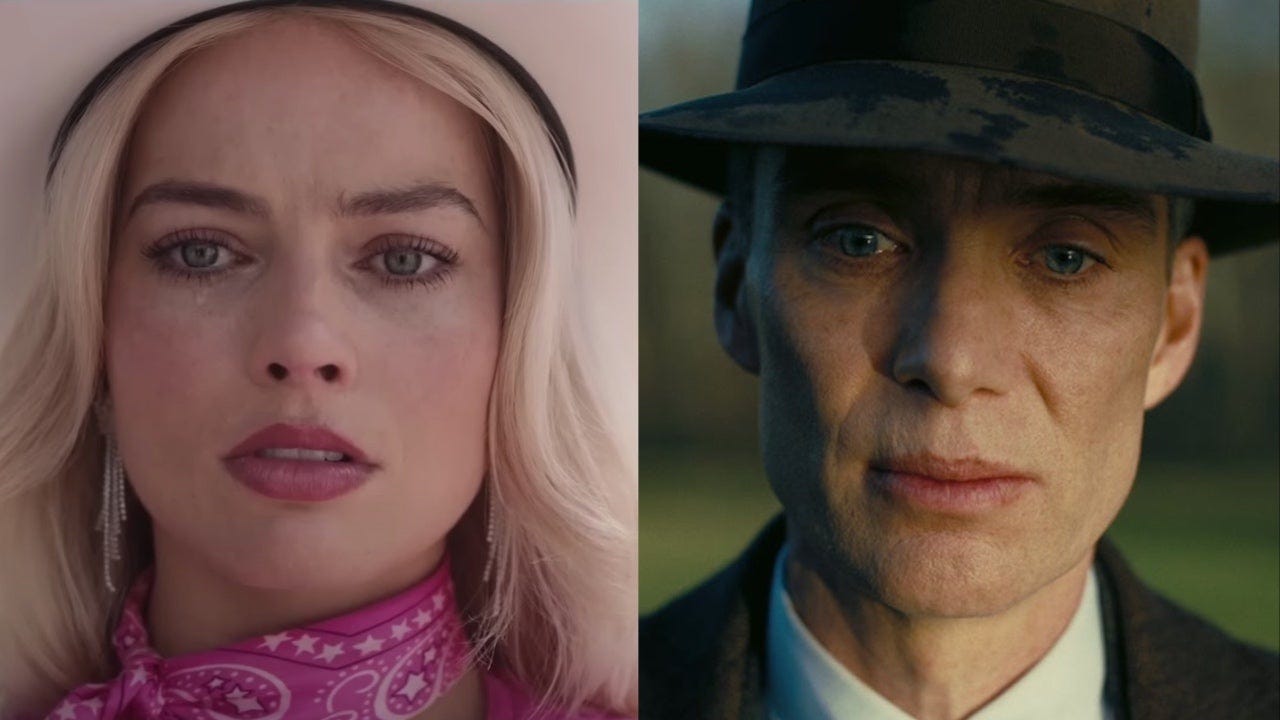[WARNING: this post contains spoilers about Oppenheimer and Barbie.]
The hard-working staff here at Spoiler Alerts decided to fully embrace Barbenheimer this past Saturday. After all, one of these films triggered serious geopolitical consequences. The other one was about the creation of the atomic bomb. It seemed worth watching them both.1 Some scattered thoughts after watching both of them:
While some film writers have tried to set up the question of which of the two films one should see, that strikes me as the wrong frame. They’re two very contrasting takes on two rather different 20th century icons. Go see both of them! See movies in theaters is a pretty great experience!
The whole reason for the Barbenheimer meme was the idea that these two films could not be more different, but I think they share three big similarities:
First, they’re both gorgeously shot. The Barbieland sequences in Barbie are spectacular, just a cotton-candy-confection of set design, wardrobe, color design, and energetic acting. As for Oppenheimer, the Trinity test alone is worth the price of admission, but Oppenheimer’s “victory” speech which immediately follows it works just as well.
Second, they’re both asking questions about the responsibility of those who create over their creations. In Oppenheimer’s case it’s about the scientist’s queasiness over creating weapons of mass destruction and entrusting them in the hands of the state. In Barbie’s case it’s about the creation of a doll that wound up having some unanticipated effects on mass culture.
Third, both films have to wrestle with the fact that the leads give excellent but somewhat restrained performances while supporting characters wind up temporarily hijacking the plots. In Oppenheimer’s case there’s a Murderer’s Row of supporting turns but it’s Robert Downey Jr. as Lewis Strauss who dominates the final hour of the film. It’s a plot that could have been excised and yet it winds up not mattering because Downey is so goddamn watchable. In Barbie’s case it’s Ryan Gosling as Ken. In both the film and in real life, Ken is superfluous in Barbie’s world, an afterthought. But Gosling commits to the role so much — and makes us feel Ken’s pain and vulnerability — that he winds up forcing the viewer to consider whether Barbie has screwed up masculinity as well as feminism.2
I enjoyed both films, but in very different ways. What Nolan is trying to do and say in Oppenheimer seems pretty clear. To the extent that we are supposed to ruminate about anything, it is about how Oppenheimer himself felt about everything he was doing. What Gerwig was trying to do was… somewhat less clear. Obviously, America Ferrara’s big speech is the crux of the film, but the “real world” in Barbie is so, well, unreal that it just feels confused. The last 20 minutes or so don’t help either, beyond the great last line. So, even though I think Oppenheimer is the better film, I’m mulling over Barbie’s confused message more than I would have thought.
I find it somewhat amusing that only the actresses who also appeared in The Devil Wears Prada have managed to shine in Christopher Nolan’s entire oeuvre. By which I mean that Anne Hathaway was great in both The Dark Knight Rises and Interstellar. Emily Blunt’s role in Oppenheimer seemed utterly thankless — until the last 15 minutes. And I can see now why she took the role.
I think the best thing I’ve read about Barbie was this Jodi Walker essay in The Ringer.
As I said, both films are in part about the moral responsibility that creators have in creating something of seismic importance. But this is also the area where Gerwig’s film is at its weakest and Nolan’s film is at its strongest. Barbie is a Mattel film, so in the end there’s only so much distance Gerwig can travel towards a real critique of the company behind the film. Because Nolan made a biopic rather than a brand film, he has more leeway. and full props to Nolan, by including the scene where Oppenheimer meets Truman, he gets close to an adequate answer. For all of Oppenheimer’s moral wrestling, and the belief that he should be the one doing the moral wrestling, what Truman says in their conversation is correct: it was his call as commander-in-chief.
There should be more weekends like Barbenheimer. Next time get Spielberg and Wes Anderson to release films on the same weekend!
In case anyone cares, we saw Oppenheimer first and then Barbie. Having now seen both films I’d recommend that order of watching them.
This should have inspired an interesting conservative response to the film. Instead, the actual conservative response entirely justifies the film’s take on the patriarchy.




If Anderson's Asteroid City came out a month later, you could have done a triple feature. As is, it would make an interesting film to cover on Space the Nation.
Although we had a different take.. I really enjoyed this comparative review.
Love this: 'I find it somewhat amusing that only the actresses who also appeared in The Devil Wears Prada have managed to shine in Christopher Nolan’s entire oeuvre. By which I mean that Anne Hathaway was great in both The Dark Knight Rises and Interstellar.' Thought she was the highlight in both films..
You can see our review here:
https://reidsonfilm.substack.com/p/barbenheimer